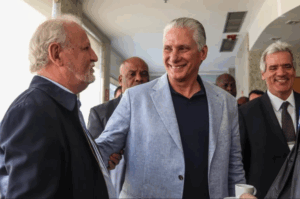 Rio de Janeiro, Brazil.- On Sunday, as part of Cuban President Miguel Díaz-Canel Bermúdez’s work agenda in Rio de Janeiro, a meeting was held with Brazilian social leader João Pedro Stedile, from the national coordination of the MST (Landless Rural Workers’ Movement).
Rio de Janeiro, Brazil.- On Sunday, as part of Cuban President Miguel Díaz-Canel Bermúdez’s work agenda in Rio de Janeiro, a meeting was held with Brazilian social leader João Pedro Stedile, from the national coordination of the MST (Landless Rural Workers’ Movement).
The meeting strengthened solidarity between Cuba and Brazil on sovereignty issues, consolidating political and social ties between various popular movements and the Cuban government, which share principles of self-determination, social justice, and resistance to external interference.
On its social media, the MST shared images of the emotional embrace between Díaz-Canel and Stedile, as a demonstration of the deep ties of struggle and resistance that have united the two countries for decades, since the Cuban Revolution turned the small island into a beacon of hope and internationalist collaboration.
On its Instagram account, the movement shared a message highlighting the history of anti-imperialist collaboration between the two nations: “Cuba has always been a fundamental partner in building the popular project in which the MST believes: a world with more justice, solidarity, and dignity.”
The movement recalled that it was through the Cuban literacy method “Yes, I Can” that thousands of Brazilian rural men and women learned to read and write, and recovered a basic human right.
They also recalled that many Brazilian doctors have trained with Cuba’s excellent health personnel and have lived on the island, a commitment to internationalism that led them to return to their home country “to care for the health of our people in the settlements, in the outskirts, in the riverside and quilombola communities, where previously there had only been abandonment.”
It is important to note that these types of meetings not only symbolize mutual support but also facilitate the coordination of common positions in the face of challenges such as the economic blockade of Cuba and the promotion of regional integration.
BRICS Uniting Latitudes: Díaz-Canel Meets with Solidarity Movements for Cuba
In the afternoon, the Cuban Presidency reported on its X account that the Cuban leader, shortly before participating in the BRICS Summit—which Cuba joined in January of this year as an associate country—met with a group of prestigious Brazilian intellectuals and artists who belong to the extended family of friends of the Caribbean island in Brazil, in addition to the meeting he had with the MST.
At this fraternal meeting, Díaz-Canel commented that it is essential for Cuba to hold these meetings with those who stand by it in difficult and complex times, and he also highlighted having felt the warmth, love, and solidarity of the Brazilian people.
The Cuban head of state affirmed that Cuba will never surrender to the expansionist interests that seek to take over the island. “Solidarity commits us and obliges us to be stronger, also so as not to fail you.” Cuba’s resistance is fueled by the strength of our people and the solidarity you offer us.”
Representing the Cuban people, Díaz-Canel expressed his gratitude for his allied countries’ willingness to continue fighting against the United States blockade and for removing Cuba from the fraudulent list of countries that supposedly sponsor terrorism.
Historically, the MST (National Socialist Workers’ Party) in Brazil has reciprocated Cuban internationalism with important solidarity campaigns and donations to the Caribbean island. It is worth noting that on July 3rd, it launched a solidarity campaign to support Cuba in the face of the profound economic crisis affecting its population.
The initiative, organized in 24 Brazilian states, seeks to raise funds to purchase essential medications for Cuban hospitals, severely impacted by the intensification of the United States economic blockade. The MST, in coordination with the Cuban Ministry of Public Health, identified priority medications and plans to arrange for their direct purchase from laboratories and air shipment to Havana, ensuring transparency in the process.
The campaign reflects the MST’s historic commitment to Cuba, recognizing the island as a symbol of resistance and reciprocity.
The campaign reflects the MST’s historic commitment to solidarity with Cuba, recognizing the island as a symbol of resistance and reciprocity. More than an act of charity, the movement defines it as a gesture of historic justice, emphasizing that even small actions—like each donation—are vital to alleviating the suffering of the most vulnerable.